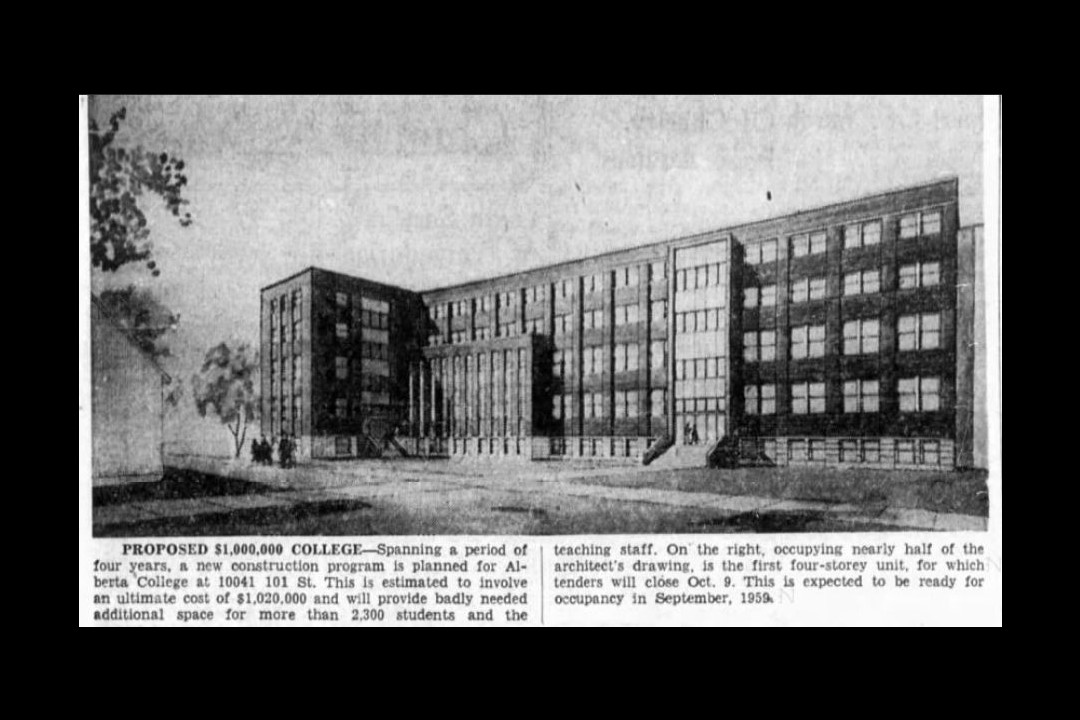On this day in 1958, one of Alberta's oldest private colleges was planning a major expansion to deal with rising enrolment.
The story of Alberta College begins in the 1860s when Rev. George McDougall bequeathed his homestead — likely the first settler building outside Fort Edmonton — to the Methodist Church, requesting that it be used for educational and missionary purposes. It wasn't until 1903 that the McDougall Church board would create Alberta College. McDougall may have gifted the land, but there weren't any buildings on it suitable for schooling. So the original class of 47 students spent their first year taking classes in retail buildings and the Masonic Hall.
The Northwest Territory Council (because Alberta College predated the province of Alberta) granted the college a charter, and construction started on McDougall Church lands. In October 1904, students were able to move into the new, permanent buildings.
Despite its churchly origins, Alberta College was a non-denominational private school: there were no religious requirements for admission. It started by offering courses in commerce, arts, and music. Before long, it added education in theology, English as a second language, and formal speech.
The college expanded, both with new buildings and a second campus, Alberta College South, when the theological school moved to a building on the still-new University of Alberta campus. Both campuses continued to see rapid growth up until the outset of World War I. At that time, both campuses were combined north of the river, so Alberta College South could be used as a wartime hospital.
In the 1920s, the southern campus merged with another theological school and eventually became part of St. Stephen's College. Alberta College North was re-renamed back to just Alberta College. A steep drop in enrolment in the 1930s almost caused the college to collapse, since it was a private institution that relied almost entirely on tuition and donations.
It limped through the Depression, however. The 1940s and '50s brought brighter fortunes, as student numbers surged again. By this time, the institution had added classes in secretarial work, bookkeeping, filing, and typing as a response to the city's growing professional class. By the early 1950s, the college had just shy of 3,000 students, straining its facilities. The 1958 expansion plan was a response to that growing need. Although the full expansion fell through due to financial issues, the college's main building was replaced in 1961.
When Alberta College marked its 75th anniversary in 1978, it was a bittersweet event. Student numbers were falling once again, this time due to the recent opening of Grant MacEwan College. The exception to this decline was the Conservatory of Music, which continued to grow and would later become one of the largest music schools in Canada. The college would sever its ties with the Methodist Church in 1991 to become an independent institution in hopes of improving its funding options. This was followed by another expansion in 1993, where the college's main building was torn down and replaced by its current incarnation.
Financial difficulties continued for the next decade. Finally, in 2000, the college determined it was no longer viable and transferred control to the province. Two years later, the college would be absorbed into MacEwan University, which became home to the Conservatory of Music. Now the Edmonton Public School Board owns the building, having purchased it for $22 million to house Centre High, where fourth- and fifth-year high school students attend to complete their studies or upgrade.
This is based on a clipping found on Vintage Edmonton, a daily look at Edmonton's history from armchair archivist @revRecluse — follow @VintageEdmonton for daily ephemera.
Correction: This story has been updated to more accurately reflect the current uses of the Alberta College building.





